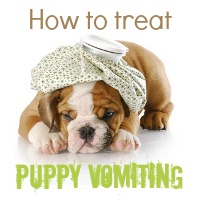FYI: If you buy something through a link on this site I may earn a commission - at NO extra cost to you.
Puppy Vomiting? Get Help Here
Although puppy vomiting is worrying for you, it's actually pretty common, and can happen for lots of different reasons including:
- Illness
- Poisoning
- A sudden change in diet
- Eating something they shouldn't (even if it's not toxic)
Your puppy might throw up just once or twice and then seem fine... or he could vomit repeatedly and show other signs of not feeling well.
The most important thing for you to do is try to figure out why he's throwing up and evaluate whether he needs to be seen by a veterinarian.

Common Causes Of Puppy Vomiting:
- An empty tummy!
strange as this may sound, one of the most common types of puppy vomiting happens when your little guy's tummy gets too empty (such as overnight). A classic sign that this is the problem is if your pup throws up yellow liquid (or it may be white/yellow and frothy), usually first thing in the morning. - A worm problem
a bad case of puppy worms can cause your pup to throw up. If this is the case you will probably find worms in his vomit - maybe just one or two, maybe a whole lot (disgusting I know!). If he's recently been given deworming medicine, then he should be fine once all the worms are out of his system, but if he hasn't been dewormed you need to get him to your vet right away as there's a serious infestation going on. - Eating something they shouldn't have
this is one of the most common reasons for puppy vomiting. They are eternally curious, and in their eyes everything is edible until proven otherwise! You would be surprised at what a puppy can ingest... but ingesting and 'digesting' are two entirely different things. Your puppy may be physically able to eat three plastic grocery sacks, or a pair of ski socks, but he isn't going to be able to digest them. There are also a lot of common household products, plants, and human foods that are poisonous to dogs - Illness or disease
vomiting is one of the first symptoms of many different canine illnesses. It could be something simple such as a mild bacterial infection, or something as serious as the potentially deadly Parvo Virus. There are usually (but not always) other signs of illness along with the vomiting, such as diarrhea, lethargy, a fever, loss of appetite and so on. - Some medicines
certain medications can cause your puppy to throw up. Classic examples include de-wormers (mentioned above), antibiotics and some medications prescribed for bone/joint issues such as Aspirin or Rimadyl. - An allergy or sensitivity
sometimes the ingredients in a particular dog food can cause a puppy or dog to throw up. True dog food allergies normally cause skin irritation such as 'hot spots', excessive itching, hairloss and so on. But, a sensitivity to a certain ingredient can cause digestive upset, including vomiting and/or diarrhea. Occasionally a reaction to vaccination, or medications (such as certain antibiotics or deworming medications) can cause your pup to vomit.
Is Your Pups' Vomiting Serious or Not?
So, how do you know whether your puppy needs veterinary help or not?

This can be tricky, but the clues are often in:
- Your puppys' behavior
- His previous activities
If little Fido has vomited once or twice, but seems to be feeling perfectly fine otherwise and is eating, drinking and playing normally, chances are the vomiting is due to something fairly minor.
It's still important to watch him for any new signs of illness, distress or pain, but is unlikely to be an emergency.
On the other hand repeated vomiting, especially if accompanied by other signs of illness such as diarrhea, loss of appetite, lethargy, fever, panting, drooling, shaking or hiding, then your pup needs to be examined by a veterinarian immediately.
It's possible for a puppy to be really ill if he's only vomited once, or has been retching or gagging. This could be due to an intestinal blockage, bloat or other conditions.
In this situation he may have a distended belly or show signs of pain/distress such as panting, pacing, drooling, whining, hiding and more.
IF you're ever in doubt, get a vet evaluation. It's always better to be safe than sorry.
These need to be evaluated by your vet immediately:
- Vomit that contains blood
- Repeated vomiting that empties your pup's tummy and yet he continues to retch and gag and can't hold down any food or water
- Throwing up that is accompanied by ANY other signs of illness such as puppy diarrhea
- Extreme lethargy, listlessness or exhaustion
- A seriously distended belly, dry-heaving or signs of stress(such as whining, pacing, panting). This could be a sign of bloat.
There are 3 ways of 'Throwing Up'!
- Vomiting
a dictionary definition of the word 'vomiting' includes 'to eject the contents of the stomach through the mouth', 'send out forcefully' or even 'to eject violently', and all of these pretty much paint a good picture of what's involved!
It's usually what you see when a dog is car sick, ill, or has food poisoning and so on. Your pup may drool first, then start to heave (caused by the strong contractions of his stomach muscles)....and eventually he'll just vomit. - Regurgitating
the dictionary definition of regurgitation include the descriptions'to rush or surge back', and 'to pour back'. Definitely sounds less violent doesn't it?
If a dog regurgitates it's food, it usually takes a loss less effort than vomiting does, almost as though the food (or whatever else is returning!) is coming back up by itself. It may seem to just pour out with little help from your pup. If your puppy eats too fast, or too much, he may well regurgitate his food, and health conditions such as Megaesophagus can also cause this. - Gagging
this can also be called 'retching' and looks similar to choking. If your dog is gagging, he may be hacking or coughing in an attempt to bring something up. In this situation you'll see more muscle movement in his chest than in his belly.
If your dog has tried to swallow something that has got lodged in his throat, has certain esophageal or heart/lung problems, bloat or an intestinal obstruction he may hack, cough or even gag in this way. Gagging rarely results in food (or much else) coming back up though.
Sometimes a puppy (or dog) who has problems with his esophagus or teeth, or even has neurological issues, won't be able to keep food or water in his mouth.
It will
sort of 'fall out' or 'pour/drip out' when he tries to eat or drink.
Puppy Vomiting - A Veterinarians' View
Diet issues are one of the main reasons for vomiting in puppies. Sometimes we change diets too quickly or introduce too many new treats at once.
A dog’s gastrointestinal tract doesn’t adapt to rapid changes in food. Other times, puppies eat food they shouldn’t—we all know they can have a naughty streak! Human food or garbage ingestion can quickly cause stomach upset in puppies. Usually vomiting due to diet changes is temporary and responds to simple treatments.
It is much more dangerous if your dog eats a solid object, such as a toy or an article of clothing. It is amazing what puppies will eat! These objects can get lodged in the stomach or intestines causing an obstruction. Puppies with gastrointestinal obstruction usually vomit very frequently, refuse to eat, and can act painful in their abdomen.
Your vet will likely recommend an x-ray to look for obstruction. Sometimes x-rays are not definitive, so your puppy may need special contrast studies, an ultrasound exam, or an exploratory surgery to diagnose obstruction. Objects in the stomach can sometimes be removed with an endoscope inserted down the esophagus, but most cases of foreign bodies require surgical removal.
It is important to diagnose this condition as soon as possible. Obstruction that persists longer than a couple days can impede blood flow to the gut, requiring that segments of intestines be removed.
It can even cause intestinal perforation and peritonitis, a severe infection of the abdominal cavity that is emergent and life-threatening.
Infectious diseases are another common cause of vomiting in puppies. A heavy parasite burden or giardia infection may be responsible. This is diagnosed either based on visual observation of worms in the stool or vomit, or by a microscopic fecal exam looking for parasite eggs.
The most concerning viral disease that causes vomiting in dogs is Parvovirus. Parvo is very contagious between puppies. In addition to vomiting, your puppy will likely have severe watery diarrhea, loss of appetite and lethargy. If your dog is not properly vaccinated for parvo and is having these symptoms, it is important to get to the vet immediately. Parvo can be deadly if not treated quickly and aggressively.
Less commonly, organ dysfunction can cause vomiting in puppies. If your puppy has chronic or severe problems with vomiting and other common causes are ruled out, your veterinarian may look for congenital liver, kidney, or intestinal diseases. This usually requires bloodwork, x-rays, or ultrasound exams.
Sometimes pet owners think their puppy is vomiting when they are actually regurgitating.
This is when food or water is ‘coughed’ up by the dog with minimal noise or effort. If it only happens occasionally, it may be because your puppy eats too fast. However, if your puppy regurgitates frequently, he should be seen by a veterinarian.
Puppies can be born with megaesophagus, a condition in which the esophagus is dilated and can’t propel food down to the stomach appropriately.
Some puppies have megaesophagus secondary to a dangerous heart defect called Persistent Right Aortic Arch (PRAA). Puppies who frequently regurgitate food should be evaluated for these conditions as soon as possible.
If in doubt, it is best to bring a vomiting puppy to the vet sooner rather than later. Even if the problem turns out to be minor, your vet can recommend treatments to get your puppy feeling better quickly.
Author: Dr. Megan Teiber, DVM
Getting The Right Treatment Is Vital
All the information on this page should help you to decide whether or not your puppy's vomiting is an emergency, but it's not always easy to be sure.

If you're in any doubt it's always better to be safe than sorry - and I'd recommend getting your pup seen by a vet right away if you're at all concerned.
Click here or on the image to the left to learn more about how to treat vomiting in puppies
You'll find all the information and advice you need to make sure your puppy gets the help he needs.
For your peace of mind, puppy and dog health information on this site has been approved by veterinarian Dr. Megan Teiber, DVM
you might also like...
- Home
- Puppy Health Care
- Puppy Vomiting





